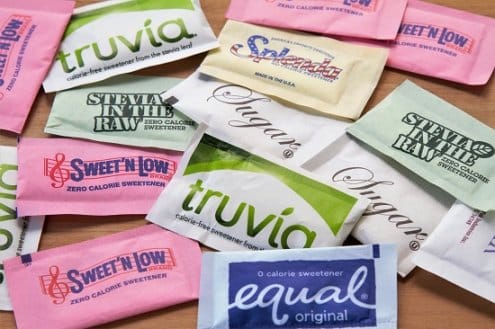Diabetes is one of the world’s most significant and common diseases. A recent advancement in controlling blood glucose levels is supplementing your diet with artificial sweeteners instead of using sugar.
These artificial sweeteners are synthetic compounds that mimic the taste of sugar but do not play a role in providing energy (calories) to the body. Since they do not provide any calories, they are widely used in many commercial products such as candies, chewing gums, sodas, and dairy products.
As demand increases for artificial sweeteners, the scientific community is wondering whether these products raise insulin levels and blood sugar. To answer this question, a brief walkthrough of insulin and blood sugar levels is needed.
Natural Causes of Insulin and Blood Sugar
The food we eat contains proteins, carbohydrates, and fats. Carbohydrates are complex molecules that contain long chains of glucose, or blood sugar, known as polysaccharides.
When we eat food rich in carbohydrates, our body will break (digest) the complex chain of food molecules and deliver ready-to-absorb glucose, which is the primary source of energy for all body cells. After a meal rich in carbs like bread, potatoes and pasta, there is an increase in blood glucose levels.
The free glucose in the blood is not taken up by the cells without a mediator, which is insulin. Once there is an increase in blood glucose levels, the beta cells of the pancreas increase the production of insulin.
Insulin helps the cells take up the glucose from the blood. Excess glucose is stored in the form of glycogen or fat. It is understood that an increase in blood glucose levels is due to the food we consume, and the counter-effect is the rise in insulin.
The sight, smell, and taste of food, even those that are not rich in carbohydrates, can also increase insulin levels. This mechanism is known as cephalic phase insulin release.
Artificial Sweeteners and Blood Sugar levels
Since artificial sweeteners are sweet to taste, there is an increase in insulin levels due to the cephalic phase mechanism. While a slight increase in insulin levels is no issue, the question is, do these artificial sweeteners increase blood sugar levels?
The answer is a sceptical yes, as the clinical studies and trials that have been conducted were not carried out on humans. A clinical study on mice proved that when the mice are given artificial sweeteners, there is a change in their gut microbiome, increasing blood sugar levels. But the results were reversed when the gut bacteria are replaced with healthy bacteria. Based on this research, it is possible that long-term use of artificial sweeteners may increase blood glucose levels in humans, but it is not yet proven.
Conclusion
There are many artificial sweeteners commercially available, including acesulfame potassium, aspartame, saccharin, and sucralose, which are widely used in diabetes management. The long-term effects of these products are unknown, with unconfirmed theories hypothesizing that they could increase both insulin and blood sugar levels.
Doctor’s Recommendation
Sugar alternatives do not affect your blood sugar levels. Artificial sweeteners are considered “free foods” because they have fewer than 20 calories and 5 grams of carbs or less, so they aren’t counted in your calorie or carb limits for diabetes. However, keep in mind that foods with artificial sweeteners may still contain other ingredients that can affect your blood sugar.
Some research suggests that switching from sugar-sweetened foods and drinks to those with artificial sweeteners may not be as beneficial as once thought, especially if consumed in large amounts. More studies are needed to fully understand this.



